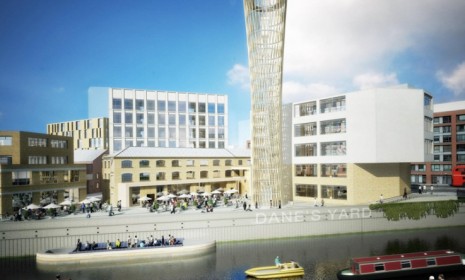The Ikea neighborhood: Wave of the future?
The Swedish furniture company will begin focusing on more than just home interiors as it designs and builds a residential area outside of London

A free daily email with the biggest news stories of the day – and the best features from TheWeek.com
You are now subscribed
Your newsletter sign-up was successful
Ikea is truly expanding its horizons with its next project. Instead of designing bookcases and chairs, the Swedish furniture company is making a whole neighborhood. Its property-developing unit, LandProp, has purchased 27 acres of unused industrial land outside London, on which it plans to develop a residential area, dubbed Strand East, for some 6,000 people. Here, a guide to the company's latest attempt to Ikea-ize your life:
Why is Ikea doing this?
The company says it wants to bring its unique sense of design to urban planning, in a way that provides affordable housing to the city's citizens, with a focus on families. The project "promises the sort of pleasant population density" that could help countries with "dire housing shortages," says Doug Saunders at Canada's The Globe and Mail. And Ikea wants to make money, too: It's common in Europe for companies to "build and own entire communities and everything in them, with the goal of making cash by renting out homes, apartments, and offices," says Tim Newcomb at TIME.
The Week
Escape your echo chamber. Get the facts behind the news, plus analysis from multiple perspectives.

Sign up for The Week's Free Newsletters
From our morning news briefing to a weekly Good News Newsletter, get the best of The Week delivered directly to your inbox.
From our morning news briefing to a weekly Good News Newsletter, get the best of The Week delivered directly to your inbox.
What will an Ikea neighborhood look like?
The area will be a "reproduction of the sort of historic, chic downtown neighborhoods you find" in central London and Paris, says Saunders. The main streets will be lined with plain townhouses and five-story apartment buildings, and smaller streets will feature two- to three-story homes. The more citified part of the neighborhood will have several condominium towers, a hotel, and offices.
How will it be different from other neighborhoods?
For one thing, it will be car-free except for buses and ambulances. All cars entering the neighborhood will have to park in a vast underground garage. The area will also have a generous number of public areas and squares, and more pedestrian walkways. Ikea will encourage the establishment of farmers' markets and flower stalls, while keeping out check-cashing shops and other "common signals of neighborhood blight," says Kim at BangStyle.
A free daily email with the biggest news stories of the day – and the best features from TheWeek.com
And will it be decorated with Ikea furniture?
No. The neighborhood won't even feature an Ikea store. So "you can leave your Allen wrench" behind, says Newcomb.
Will the area actually be a good place to live?
It depends. While Ikea is offering a "pleasant environment" that encourages "you to have fun," the neighborhood's organic development could be choked off by a "mega-landlord with a penchant for neat design and social order," says Saunders. Ikea will no doubt keep Strand East "as well-run and orderly as possible," but "the concept of living in a cookie-cutter furniture-giant-run utopia is enough to induce doubt," says Kim.
Sources: BangStyle, The Globe and Mail, TIME


